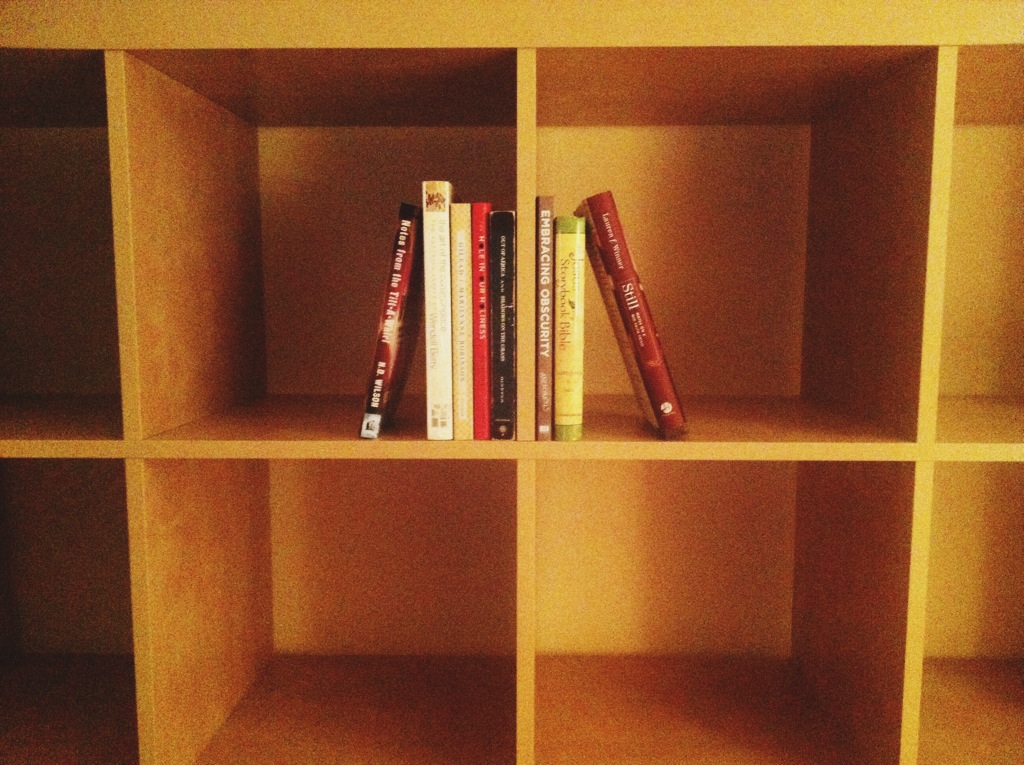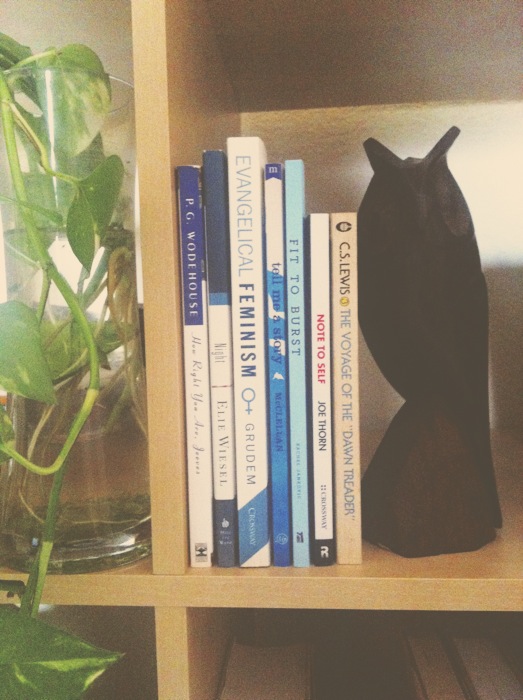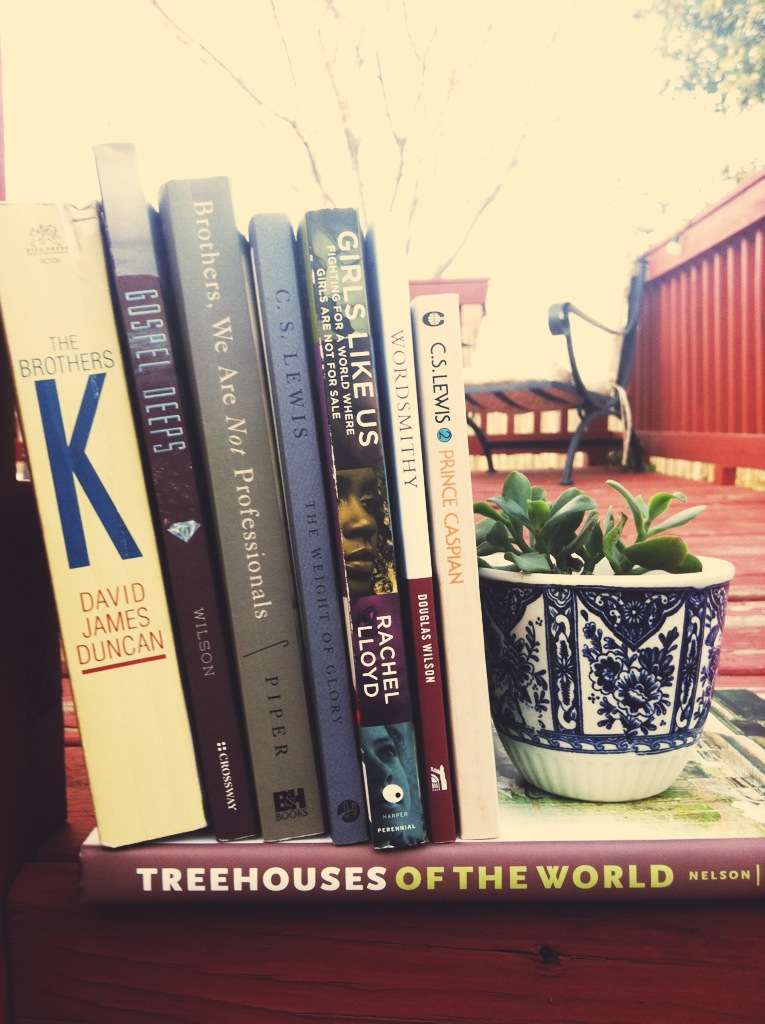 Lit! A Christian's Guide to Reading Books // Tony Reinke
Lit! A Christian's Guide to Reading Books // Tony Reinke I know it's only January 2nd, but I'd like to attribute any reading I get done this year (whether I complete 100 or not) to Tony Reinke. Lit! A Christian Guide to Reading Books was first on my list to tackle this year, with good reason. This project is not about reading 100 books or scaling a monumental goal, but refocusing, realligning, and recalibrating my love for the written word. Lit! is separated into two main sections: the theology of reading and the act of reading. In other words, the How of reading and How we read. Riddled with helpful thoughts, methods, and principles, the entire book encapsulates the importance of thinking in our reading, instead of simply reacting to our reading—a hint we all could take.
I know it's only January 2nd, but I'd like to attribute any reading I get done this year (whether I complete 100 or not) to Tony Reinke. Lit! A Christian Guide to Reading Books was first on my list to tackle this year, with good reason. This project is not about reading 100 books or scaling a monumental goal, but refocusing, realligning, and recalibrating my love for the written word. Lit! is separated into two main sections: the theology of reading and the act of reading. In other words, the How of reading and How we read. Riddled with helpful thoughts, methods, and principles, the entire book encapsulates the importance of thinking in our reading, instead of simply reacting to our reading—a hint we all could take.
The Allure of Hope: God's Pursuit of a Woman's Heart // Jan Meyers My roommate has been asking me to read a book that particularly touched her this year. Part of my aim in this project was to tackle books I might not naturally be drawn toward, and this book was one. The Allure of Hope is written by Jan Meyers, an unmarried woman who writes about her journey of singleness and her hope in God. I read this book in one night, partially because it was a quick and easy read, and partially because while it's a subject I'm obviously interested in, I'm less interested in reading books that dwell on the absence of what I also long for. That said, Jan's book was a simple bit of encouragement. I found that she quoted many of my favorite authors and that we had struggled with many similar themes in our singleness. I particularly appreciated the subtitle, and common theme in the book, that it is God who pursues our hearts—and less about us constantly striving after something that seems unattainable.
My roommate has been asking me to read a book that particularly touched her this year. Part of my aim in this project was to tackle books I might not naturally be drawn toward, and this book was one. The Allure of Hope is written by Jan Meyers, an unmarried woman who writes about her journey of singleness and her hope in God. I read this book in one night, partially because it was a quick and easy read, and partially because while it's a subject I'm obviously interested in, I'm less interested in reading books that dwell on the absence of what I also long for. That said, Jan's book was a simple bit of encouragement. I found that she quoted many of my favorite authors and that we had struggled with many similar themes in our singleness. I particularly appreciated the subtitle, and common theme in the book, that it is God who pursues our hearts—and less about us constantly striving after something that seems unattainable.
Mere Churchianity: Finding Your Way Back to Jesus-Shaped Spirituality // Michael Spencer Jared Wilson first recommended Mere Churchianity to me a year or so ago and I read it quickly then, but I wanted to reread particularly the second half of the book—which I felt was the most important part of it. Mere Churchianity, by Michael Spencer (The Internet Monk), published posthumously, is the story of a man frustrated with traditional church and much of evangelicalism. The book places such a strong emphasis on what he calls the "Jesus-shaped spirituality," that I found myself a bit frustrated nearing the end: what about the Father's pursuit of us? what about the continuing work of the Holy Spirit? But Spencer saved himself in the end with a question and answer section that I hadn't read the first time through. I recommend this book highly particularly if you are one of the thousands who struggle with the way we "do church," the lingo of the Church, or practices of Christianity (tithing, membership, service, etc.).
Jared Wilson first recommended Mere Churchianity to me a year or so ago and I read it quickly then, but I wanted to reread particularly the second half of the book—which I felt was the most important part of it. Mere Churchianity, by Michael Spencer (The Internet Monk), published posthumously, is the story of a man frustrated with traditional church and much of evangelicalism. The book places such a strong emphasis on what he calls the "Jesus-shaped spirituality," that I found myself a bit frustrated nearing the end: what about the Father's pursuit of us? what about the continuing work of the Holy Spirit? But Spencer saved himself in the end with a question and answer section that I hadn't read the first time through. I recommend this book highly particularly if you are one of the thousands who struggle with the way we "do church," the lingo of the Church, or practices of Christianity (tithing, membership, service, etc.).
Half Broke Horses: A True-Life Novel // Jeanette Walls The Glass Castle was one of my favorite 2012 reads, so I knew Half Broke Horses wouldn't disappoint. Jeannette Walls wrote what she called a "true-life novel" based on her grandmother's life. The back cover reads, "Half Broke Horses is Laura Ingalls Wilder for adults, as riveting and dramatic as Isak Dinesen's Out of Africa or Beryl Markhams West with the Night." With a quote like that, I'm hooked. I read this book in one sitting—about four hours one Sunday morning. Wells' writing flows quickly, easily, and is still somehow spellbinding and deep. She's a writer worth her salt and worth reading especially if you love memoir (and I do!). I particularly love the way Wells doesn't sugarcoat any of the good or bad her family engaged in. She tells the story and I can't help but wonder if we have many storytellers like her these days—or any stories being lived like the ones she tells.
The Glass Castle was one of my favorite 2012 reads, so I knew Half Broke Horses wouldn't disappoint. Jeannette Walls wrote what she called a "true-life novel" based on her grandmother's life. The back cover reads, "Half Broke Horses is Laura Ingalls Wilder for adults, as riveting and dramatic as Isak Dinesen's Out of Africa or Beryl Markhams West with the Night." With a quote like that, I'm hooked. I read this book in one sitting—about four hours one Sunday morning. Wells' writing flows quickly, easily, and is still somehow spellbinding and deep. She's a writer worth her salt and worth reading especially if you love memoir (and I do!). I particularly love the way Wells doesn't sugarcoat any of the good or bad her family engaged in. She tells the story and I can't help but wonder if we have many storytellers like her these days—or any stories being lived like the ones she tells.
The Meaning of Marriage: Facing the Complexities of Commitment with the Wisdom of God // Tim & Kathy Keller I told one of my roommates when I was halfway through The Meaning of Marriage on January 4th that it was probably going to be the best book I would read all year. Nothing like jumping the gun, but I think I'll hold to it. Tim and Kathy Keller have written, I think, not only one of the most helpful marriage books, but also perhaps one of the most helpful *singleness* books, and undoubtedly, a book that adorns and displays the gospel and its workings inside of a marriage and our lives. Their chapter on the Essence of Marriage had me weeping, repenting, and begging God to show me the fullness of His love. His chapter on Singleness and Marriage had one page in it that I cannot get out of my mind, perhaps one of the most helpful examples of how to broach a conversation when what I call Soul Pornography is taking place. I'm not going to tell you what Kathy does here, mostly because I want you to read this book. I think that everyone should read this book.
I told one of my roommates when I was halfway through The Meaning of Marriage on January 4th that it was probably going to be the best book I would read all year. Nothing like jumping the gun, but I think I'll hold to it. Tim and Kathy Keller have written, I think, not only one of the most helpful marriage books, but also perhaps one of the most helpful *singleness* books, and undoubtedly, a book that adorns and displays the gospel and its workings inside of a marriage and our lives. Their chapter on the Essence of Marriage had me weeping, repenting, and begging God to show me the fullness of His love. His chapter on Singleness and Marriage had one page in it that I cannot get out of my mind, perhaps one of the most helpful examples of how to broach a conversation when what I call Soul Pornography is taking place. I'm not going to tell you what Kathy does here, mostly because I want you to read this book. I think that everyone should read this book.
Homeland // Barbara Kingsolver I read Poisonwood Bible in the summer of 2008, eating, drinking, and sleeping those words. It's rare to find a wordsmith of Kingsolver's caliber who also crafts a tale as spellbinding and unforgettable as her stories are. Homeland is a collection of short stories and so it was a perfect book of fiction to start out with this year. Each story is so absolutely distinct from any of the others, I couldn't help but wonder if there's any truth to the old adage, "A good writer writes what they know best." What is evident from all of Barbara Kingsolver's stories is that she knows human nature best, its sins and secrets and joys, and so she wraps a narrative around those components and gifts it to the world.
I read Poisonwood Bible in the summer of 2008, eating, drinking, and sleeping those words. It's rare to find a wordsmith of Kingsolver's caliber who also crafts a tale as spellbinding and unforgettable as her stories are. Homeland is a collection of short stories and so it was a perfect book of fiction to start out with this year. Each story is so absolutely distinct from any of the others, I couldn't help but wonder if there's any truth to the old adage, "A good writer writes what they know best." What is evident from all of Barbara Kingsolver's stories is that she knows human nature best, its sins and secrets and joys, and so she wraps a narrative around those components and gifts it to the world.
The Lion, the Witch, and the Wardrobe // C.S. Lewis When I was eight years old my mother read the Chronicles of Narnia aloud to my brothers and me. I remember late nights of us begging for just one more chapter and her acquiesing. I don't know why I've never picked them up since, certainly not from lack of opportunity. It's a testament to Lewis's writing though that two decades later I kept myself awake at night reading just one more chapter. I began with The Lion, the Witch, and the Wardrobe, because that is how Lewis said the series began, even though many people still insist on reading Magicians Nephew first (my mother did). The interesting thing about reading the same book twenty years later is that my imagination hasn't changed a bit—I still see Narnia in my mind exactly as I envisioned it on those late nights wrapped in afghans in our living room.
When I was eight years old my mother read the Chronicles of Narnia aloud to my brothers and me. I remember late nights of us begging for just one more chapter and her acquiesing. I don't know why I've never picked them up since, certainly not from lack of opportunity. It's a testament to Lewis's writing though that two decades later I kept myself awake at night reading just one more chapter. I began with The Lion, the Witch, and the Wardrobe, because that is how Lewis said the series began, even though many people still insist on reading Magicians Nephew first (my mother did). The interesting thing about reading the same book twenty years later is that my imagination hasn't changed a bit—I still see Narnia in my mind exactly as I envisioned it on those late nights wrapped in afghans in our living room.
For the Love of God: A Daily Companion for Discovering the Riches of God's Word, Volume 1 // D.A. Carson This is one of my "Throughout the whole year" reads, especially as it is a bible reading devotional. I've never been good at reading plans (bible or otherwise), my personality functions best in structure schedules with plenty of flexibility within the schedule (ie. Read the Bible at the same time each day, with flexibility in what part of the Bible I read). There isn't a lot of fexibility within this book and I can already see that frustrating me a bit. It's also good for me, though, and I hope I remain disciplined throughout the year. (Pray for me on this one though!)
This is one of my "Throughout the whole year" reads, especially as it is a bible reading devotional. I've never been good at reading plans (bible or otherwise), my personality functions best in structure schedules with plenty of flexibility within the schedule (ie. Read the Bible at the same time each day, with flexibility in what part of the Bible I read). There isn't a lot of fexibility within this book and I can already see that frustrating me a bit. It's also good for me, though, and I hope I remain disciplined throughout the year. (Pray for me on this one though!)
Special thanks to those of you who gifted books I read this month for 100 in 2013 (Janine Bergey, Alison Luna, Nancy Hull, & Jenna Boyd).
 As I was packing the last of our stuff last week and put July's books from 100 in 2013 in a box to haul to our new place, I realized I'd only actually had time to read half of one of them. Half. Of one. Of eight.
As I was packing the last of our stuff last week and put July's books from 100 in 2013 in a box to haul to our new place, I realized I'd only actually had time to read half of one of them. Half. Of one. Of eight.














